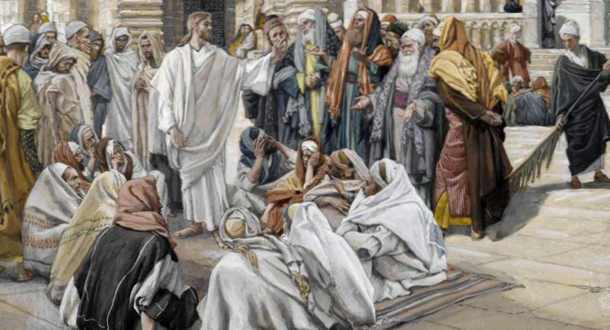
Scripture:
Reflection:
We know that the Gospel of Matthew can best be understood through the lens of Jewish Christian community concerns and worship, and the Gospel of Luke through the lens of Gentile Christian community concerns. But what of the Gospel of Mark? If not focused sharply on Jewish or Gentile interests and challenges, then what?
Mark definitely holds a point of view and theology for a community suffering persecution. This gospel teaches us that the mystery of Jesus as the Christ will be revealed to those who faithfully follow Jesus on the Way of the Cross, no matter how broken, imperfect, or bewildered the followers may be. Jesus calls us to follow him. How will we respond?
Today’s gospel demonstrates that theology well. Mark presents us with three groups, and a Messianic Secret that arcs his entire gospel. Today’s gospel raises the curtain on these themes.
The first group are the scribes and Pharisees. Whenever they show up, they respond negatively toward Jesus and his teaching. Jesus taught with authority, “and not as the scribes,” Mark tells us. Dark clouds are beginning to gather. Later we hear the scribes and Pharisees condemning Jesus for allowing his disciples to pluck and eat grain on the Sabbath, and healing on the Sabbath, and teaching about marriage and divorce. And the list goes on. Negativity was their response.
The crowd is the second group. How did they respond to Jesus’s teaching and healing? They responded with amazement. “The people were astonished at his teaching,” we hear in the gospel. And because of their amazement and astonishment, Jesus’ “fame spread everywhere throughout the whole region.” Amazement was their response.
The followers of Jesus, his disciples are the third group. Jesus teaches them, instructs them. They sit at Jesus’ feet as he teaches them. They see his miracles. But they are muddled in their response. They are thick-headed. They misunderstand Jesus despite his best efforts. Their response? Confusion, uncertainty, and fear.
Incidentally, so embarrassing is the behavior of the disciples in Mark’s gospel that Matthew and Luke work overtime to clean them up, comb their hair, make them more presentable.
Again, Mark gives us three groups throughout his gospel: the Scribes and Pharisees, the Crowd, and the Disciples.
Mark also presents a unique aspect to his gospel – the Messianic Secret or what scholars call the Markan Secret. Whenever Jesus healed someone, he would give them a blunt instruction: “Tell no one. Tell no one.”
Today’s gospel introduces this theme. No one, not the crowd, the Scribes, not the followers of Jesus understand who Jesus truly is – except the unclean spirit. “What have you to do with us, Jesus of Nazareth? I know who you are – the Holy One of God
Immediately, Jesus rebuked him, saying: “Quiet! Come out of him.” Literally, Jesus said “phimotheti! That is, “Be muzzled.” Ironically, the evil, unclean spirit possessing the young man understands Jesus better than anyone there. Throughout the gospel, Jesus will order those whom he has healed to tell no one.
Why the Messianic Secret? Because the fulness of who Jesus is, the Christos, would be revealed and understood only at the cross and resurrection.
St. Thomas Aquinas speaks of the four poisons of sin. They are wealth, power, pleasure, and honor. We see some of them played out in today’s gospel.
The crowd, for instance, in their amazement, took a kind of curious pleasure, titillation in hearing Jesus and witnessing his miracles. They sought pleasure, a self-centered, self-satisfying enjoyment. Nothing more.
What of the scribes and Pharisees? They were consumed by power and honor. They wore
elegant robes as a sign of prestige and importance. They took the best seats in the synagogue. And why not? They are far more important than those others. The Scribes also were well represented in the powerful Sanhedrin, the ruling group of the Temple in Jerusalem. It was no surprise then, that this group felt threatened by Jesus, his teaching, and his popularity with the people.
What is the antidote to these four poisons of sin? Humility, Aquinas tells us. Humility is the thread that unites today’s readings and its themes.
It is humility that Hannah powerfully demonstrates in the first reading. In the midst of her grief, she prays with power, persistence, and trust that God will respond to her petition. No wealth, power, pleasure, or honor here. Only humility and trust in God.
Humility also permeates Hannah’s song, her Magnificat: God “raises the needy from the dust, from the dung heap he lifts up the poor.”
And it is the garment of humility that clothes the rag-tag, fumbling followers of Jesus.
Humility is the vaccine against the four-headed virus of wealth, power, pleasure, and honor.
The disciples stumbled, they failed, they fell flat on their faces. In fear they fled the cross. In fear, the women fled from the tomb, even though it was time to reveal to the world who Jesus is. The two messengers told them: Go and tell. Announce the good news to the world. Go and tell.
Mark’s gospel, today’s gospel challenges us: Will we follow Jesus, and if so, how will we respond?
The only way to respond and to understand the Messianic Secret, who is Jesus, is by following Jesus all the way to Calvary and the Tomb. Only then will we understand that Jesus is the true Messiah, the Christos who heals and saves.
It does not matter how often we may fail or falter. It does not matter how often we may misunderstand. It only matters that we respond to the call of Jesus, to follow him, and to proclaim the good news by the way we live. Go and tell. Humility will guide our way.
Deacon Manuel Valencia is on the staff at Mater Dolorosa Passionist Retreat Center, Sierra Madre, California.
